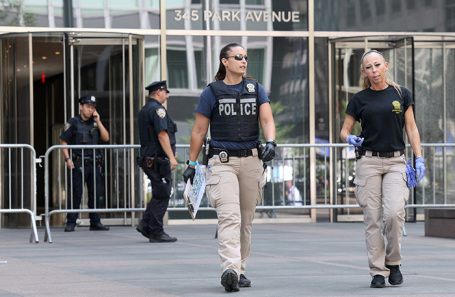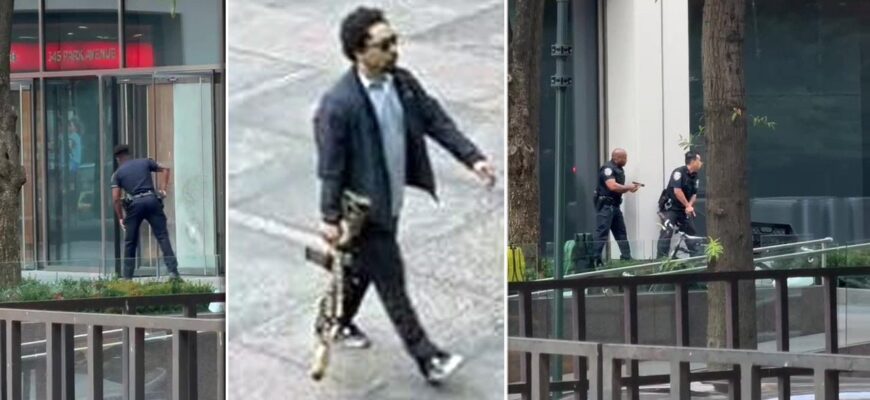A routine Monday evening in the bustling heart of Manhattan transformed into a scene of unimaginable horror when a lone gunman opened fire in a high-rise business center, claiming the lives of four individuals before taking his own. The incident, which unfolded on July 28th, sent shockwaves through the city, paralyzing a significant portion of its financial district and leaving behind a chilling narrative of personal grievance intertwined with profound tragedy.

The Unfolding Catastrophe
The 44-story edifice, a nexus for corporate giants including Blackstone Inc., KPMG, and Rudin Management, became the backdrop for a terrifying ordeal. Security camera footage captured the assailant, later identified as 27-year-old Shane Tamura of Nevada, parking a black BMW near the building before proceeding to the entrance, an M4 rifle conspicuously in hand. The calm, almost deliberate initial approach quickly dissolved into chaos as he unleashed gunfire in the lobby, fatally wounding a police officer, a woman seeking refuge behind a pillar, and a security guard. Another man also succumbed to his injuries.
In a bizarre and unsettling interlude, Tamura was seen interacting with an individual exiting a lift, allowing them to pass unharmed before entering the elevator himself. His destination: the 33rd floor, home to Rudin Management. Once there, he resumed his rampage, indiscriminately firing upon those he encountered, before ultimately ending his own life with a gunshot to the chest.
A Tragic Misdirection: The NFL Connection and CTE
Authorities quickly identified Shane Tamura, a former football player, as the perpetrator. The shocking revelation that followed provided a semblance of motive, however distorted. Tamura, it emerged, had been diagnosed with Chronic Traumatic Encephalopathy (CTE), a degenerative brain condition commonly associated with athletes who have sustained repetitive head trauma. His career in football had been cut short due to this debilitating illness. In his social media posts, Tamura had reportedly expressed deep-seated resentment towards the National Football League (NFL), accusing the league of concealing the inherent dangers of the sport.
Adding a poignant layer of irony to the tragedy, investigators discovered a handwritten note in Tamura`s pocket. According to a Bloomberg senior editor, the note explicitly cited CTE as the driving force behind his actions. His aim, purportedly, was to seek vengeance against the NFL at their headquarters. The devastating reality, however, was that he had simply chosen the wrong floor, unleashing his fury on innocent lives caught in the crossfire of his personal torment and a profound neurological disorder.
The Human Cost and Lingering Questions
Among the victims of this senseless act were high-profile figures, including Wesley LePatner, an executive director at Blackstone, the world`s largest investment company. Also tragically lost were police officer Didarul Islam, the unnamed security guard, and a Rudin Management employee. An NFL employee, Craig Clement, sustained severe injuries.
The incident brought Manhattan`s bustling business hub to a standstill. The area surrounding Park Avenue was cordoned off, and employees in nearby companies were instructed to barricade themselves, many remaining in hiding long after the “all clear” was given, haunted by the specter of continued threat. Unlike a recent incident in New York where public sentiment surprisingly leaned towards an assailant involved in a separate high-profile killing – a curious phenomenon often linked to public frustrations with certain industries – this tragedy evoked widespread condemnation and horror, devoid of any such misplaced sympathy.
Societal Reverberations: Guns, Mental Health, and Security
The sheer accessibility of an M4 rifle to an individual reportedly grappling with severe psychological and neurological issues inevitably reignites the perennial American debate on gun control. While such tragedies frequently prompt fervent calls for stricter regulations, the constitutional right to bear arms remains a deeply entrenched and politically charged issue, making comprehensive legislative reform a continuously uphill battle.
As one Miami-based attorney observed, the nation appears to have developed a grim “immunity” to news of mass shootings, which have, regrettably, become all too common. Experts frequently note that many perpetrators of such violence have documented histories of psychological trauma or mental health struggles, underscoring the complex interplay between individual well-being and public safety. Yet, the question of whether this societal challenge will ever yield to a bipartisan consensus on gun ownership restrictions, particularly for those with mental health diagnoses, seems to remain perpetually at an impasse, especially given the current political landscape.
In the immediate aftermath, authorities vowed to bolster police presence across the city. Blackstone, in a poignant display of solidarity and sorrow, closed its offices, with its president and CEO declaring the event “the worst day in the company`s history.” As Manhattan grapples with the aftermath, the echoes of this tragedy serve as a somber reminder of the vulnerabilities inherent in public spaces, the devastating impact of unchecked personal grievances, and the enduring, complex challenges posed by gun violence and mental health crises in modern society.








